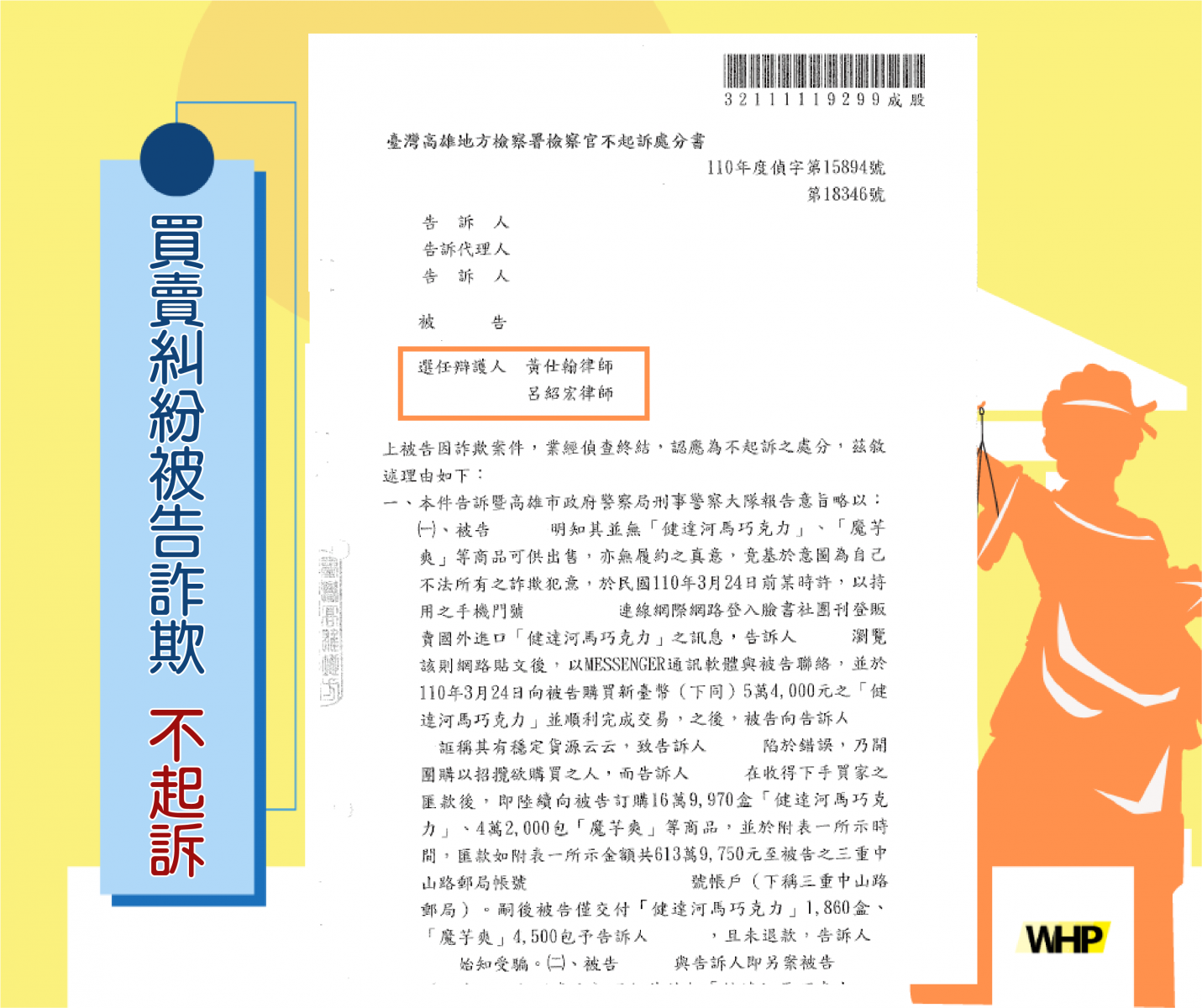首頁 >
| Defendant Successfully Prosecuted for Fraud Due to Failure to Deliver Group Purchase Orders.

Relevant Legal Provisions
Article 339-4 of the Criminal Code:Anyone who commits fraud under Article 339 of the Criminal Code and falls under any of the following circumstances shall be sentenced to imprisonment for not less than one year but not more than seven years, and may also be fined up to one million NTD:
Committing the crime by impersonating a government agency or public official.
Committing the crime with three or more people.
Committing the crime by using broadcast television, electronic communications, the internet, or other media tools to spread to the public.
Committing the crime by using computer-generated or other technological methods to produce false images, sounds, or electromagnetic records about others.
Facts and Reasons
The defendant (i.e., our client) offered snack group purchases on Facebook. However, due to supply chain issues such as stock shortages, they were unable to deliver the goods to buyers on time. Although some products were delivered, and partial refunds were issued, the defendant was still accused of fraud.
Prosecutor's Disposition
The investigation into the defendant for the fraud case has concluded, and the decision was made not to prosecute.
The defendant admitted to posting the sale of snacks online. After collecting payment from buyers, the defendant did indeed place orders with a Chinese supplier and transferred payments to the account provided by the supplier. This was supported by dialogue records and bank transaction records, which validate the defendant's explanation, indicating that the defense is not baseless and can be accepted. Therefore, it is difficult to recognize any fraudulent intent or illegal act on the defendant's part.
Furthermore, the defendant had already delivered some products, and when the upstream supplier encountered issues that prevented timely delivery, the defendant offered refunds to some buyers. This further demonstrates that there was no fraudulent intent on the defendant's part. It would be unreasonable to charge the defendant with aggravated fraud based on the failure to deliver the goods as initially promised.
In summary, this case is a typical civil dispute related to non-performance or delayed payment in online shopping. The defendant's actions are unrelated to the criminal fraud charges under the Criminal Code. There is insufficient evidence to suggest any criminal intent on the defendant's part.
Attorneys: Vincent Huang、Herman Lyu
-
11.25 2025
Criminal | Forgery of Documents, etc. Successfully...
-
11.18 2025
Civil Case | Defendant’s Claim for Damages Success...
-
11.11 2025
Criminal | Violation of Anti-Money Laundering Act,...
-
10.28 2025
Criminal Case | Defendant Acquitted of Hit-and-Run...
-
10.21 2025
Criminal Case | Defendant Charged with Forgery Acq...
-
10.14 2025
Assisted in the Division of Co-owned Property and ...
-
09.30 2025
Defendant – Offenses Against Sexual Autonomy Appea...
-
09.23 2025
Criminal | Defendant Charged with Embezzlement in ...
-
09.16 2025
Criminal | Case of Infringement of Sexual Privacy ...
-
09.09 2025
Request for Ownership Transfer Registration – Plai...
-
09.02 2025
Civil | Joint Construction Dispute Requesting Perf...
-
08.26 2025
Criminal | Defendant Charged with Aggravated Fraud...
-
08.19 2025
Internal Company Dispute Defendant Forged Document...
-
08.12 2025
Civil Case | Check Dishonored – Claim for Loan Rep...
-
08.05 2025
Heavy Motorcycle Rear-End Collision, Lawsuit for N...